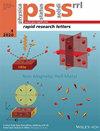Developing GeSbTe superlattice through understanding of the reversible phases and engineering its interspaces
IF 2
4区 物理与天体物理
Q3 MATERIALS SCIENCE, MULTIDISCIPLINARY
引用次数: 0
Abstract
Interfacial phase‐change materials (iPCM), which are alternatively stacked with GeTe and Sb通过了解可逆相并设计其间隙来开发 GeSbTe 超晶格
界面相变材料(iPCM)是一种在超晶格结构中交替堆叠 GeTe 和 Sb2Te3 的材料,被视为具有更好的整体相变特性的下一代 PCM。然而,一些研究报告指出,在运行过程中会出现熔淬过程,即在可逆转换过程中无法保持初始超晶格结构,而不是最初提出的无熔淬相变机制。本文采用分子束外延技术合成了 GeSbTe 超晶格,并通过仔细的结构分析研究了用光学脉冲激光器(KrF;280 nm,25 ns)辐照超晶格并重新退火或施加不同电脉冲所获得的可逆相。结果表明,无论处于哪种可逆相,碲原子都平行于界面排列,而阳离子和固有空位在相变过程中的分布则有所不同。通过富集固有空位,可以提高存储单元循环操作的稳定性;通过掺杂工程扩大间隙,可以降低开关能量。本文受版权保护。
本文章由计算机程序翻译,如有差异,请以英文原文为准。
求助全文
约1分钟内获得全文
求助全文
来源期刊

Physica Status Solidi-Rapid Research Letters
物理-材料科学:综合
CiteScore
5.20
自引率
3.60%
发文量
208
审稿时长
1.4 months
期刊介绍:
Physica status solidi (RRL) - Rapid Research Letters was designed to offer extremely fast publication times and is currently one of the fastest double peer-reviewed publication media in solid state and materials physics. Average times are 11 days from submission to first editorial decision, and 12 days from acceptance to online publication. It communicates important findings with a high degree of novelty and need for express publication, as well as other results of immediate interest to the solid-state physics and materials science community. Published Letters require approval by at least two independent reviewers.
The journal covers topics such as preparation, structure and simulation of advanced materials, theoretical and experimental investigations of the atomistic and electronic structure, optical, magnetic, superconducting, ferroelectric and other properties of solids, nanostructures and low-dimensional systems as well as device applications. Rapid Research Letters particularly invites papers from interdisciplinary and emerging new areas of research.
 求助内容:
求助内容: 应助结果提醒方式:
应助结果提醒方式:


